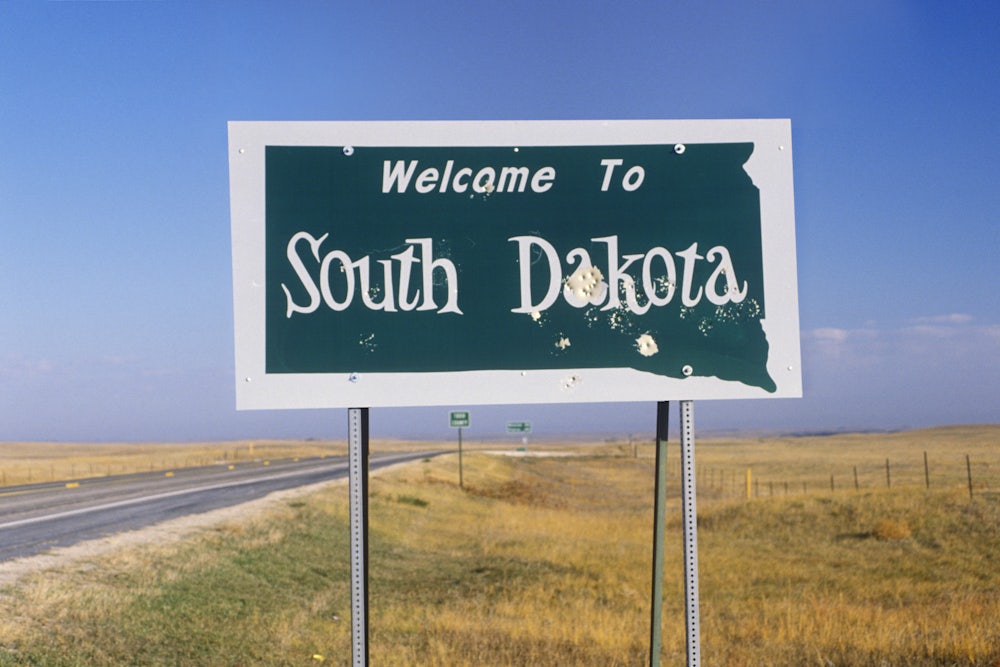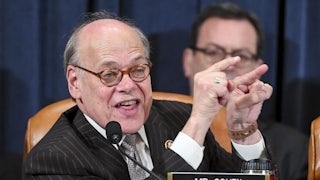The news out of Washington, especially for Democrats, is reliably grim these days. Following yet another betrayal by Joe Manchin, the party’s critical fiftieth vote in the evenly split Senate, one might have the impression that Congress is done legislating for the year (except perhaps in rare cases where a few Republicans peel off to support, say, a watered-down gun-control bill). But last week reminded us of one area of robust bipartisan agreement: cracking down on kleptocrats.
The Democratic-controlled House on Thursday overwhelmingly passed what may well end up as the greatest piece of anti–money laundering reform the United States has seen in decades, taking a sledgehammer to America’s role as a destination for dirty money.
The Enablers Act, bundled into the broader National Defense Authorization Act, takes aim at those in the U.S. who act as effective gatekeepers for the U.S. financial system, freely and legally welcoming rotten clients regardless of the source of their income. While American banks have spent years with internal anti–money laundering protocols, thanks largely to the passage of the 2001 Patriot Act, other industries and professionals in the U.S. have been able to skirt similar regulations thanks to loopholes and lobbying in Washington.
This span of “enablers” runs wide. American lawyers have spent decades expanding their pro-kleptocracy services—perfectly freely and legally setting up anonymous shell companies, structuring real estate deals, and lobbying for pro-offshoring policies, all on behalf of oligarchic and dictatorial clients. Since these lawyers and law firms didn’t have any legal requirements to check the source of clients’ income, they could toss their doors wide open for the crooked and the corrupt, regardless of how those clients made their wealth.
The same goes for those who set up trusts for such clients. Thanks to permissive laws, trusts in multiple American states have transformed into the preferred tool to hide and protect illicit wealth; South Dakota has seen a stampede of hundreds of billions of dollars in anonymous, untraceable wealth in recent years. While anonymous shell companies in places like Delaware and Wyoming have faced scandals, it’s only in the past year that journalists unearthed the identities of some of the clients who’ve turned to these trusts: environmental destroyers, human rights abusers, and crooked politicians.
With the new Enablers Act, though, the best days of these trust providers may be behind them. The same goes for the American lawyers who used things like attorney-client privilege to hide clients’ financial information, American investment advisers using their financial wizardry to launder their clients’ wealth, and American accountants using their pecuniary tricks to find the most airtight protections for their clients. All of these enablers will still, theoretically, be able to work with whichever clients they’d like. But no longer will they be able to look the other way or freely take a slice of profit for them and their firms. Instead, they will have to identify the actual owners they’re helping (as opposed to anonymous shells or front men), as well as establish internal anti–money laundering programs and due diligence policies. Likewise, similar to banks, they’ll have to file suspicious activity reports to the federal government, helping authorities track where and how kleptocrats have been moving their funds in the U.S.
The Enablers Act isn’t yet law, and is still awaiting a Senate complement. Once it comes together in the Senate—presumably with bipartisan support, as well—the outlook is good for it to move quickly toward becoming law. But even just moving forward in the House is a phenomenal sign for the future of American counter-kleptocracy policy. The U.S. has made unprecedented progress in the past two years alone, from the Biden administration elevating corruption to a core national security threat to Congress passing legislation to finally ban the formation of anonymous shell companies. In that sense, the Enablers Act is simply of a piece with what we’ve seen in recent months: American policymakers finally taking the realities, and the threats, of rampant kleptocracy seriously and realizing America’s central place in the broader world of transnational money laundering.
But given the breadth of the bill’s targets, the legislation is already poised to be the most impactful since the U.S. moved to ban the formation of anonymous shell companies last year—and may potentially be the most monumental piece of counter-kleptocracy legislation in the U.S. in decades. As Democratic Representative Tom Malinowski, the bill’s sponsor, said when announcing its inclusion in the National Defense Authorization Act, the Enablers Act is the “most significant anti–money laundering reform” since the banking regulations some two decades ago.
Activists pushing for counter-kleptocracy policy agree. It’s a “huge step forward in cracking down on global corruption and money laundering,” according to Citizens for Responsibility and Ethics in Washington.* Scott Greytak, the advocacy director at Transparency International U.S., said the Enablers Act “is the single most important anticorruption measure the United States Congress can adopt right now to prevent corrupt Russian officials and future kleptocrats from hiding and growing their dirty money in the United States.”
There’s one additional element within the Enablers Act that points directly to the reason for the sudden anti–money laundering successes in the U.S. over the past two years. With little fanfare, counter-kleptocracy policy has become one of the most bipartisan arenas in Washington, with bills and legislation routinely gathering multiple sponsors from both sides of the aisle. The bill banning anonymous shells, the recent legislation targeting foreign funding of American think tanks, omnibus bills that bundle multiple counter-kleptocracy components—all of them have come with bipartisan support. The Enablers Act is no different, with Republican Representative Joe Wilson joining Malinowski in pushing the bill. “Middlemen in foreign transactions should be subject to the same anti–money laundering checks as banks, and this brings us one step closer,” Wilson said about the Enablers Act.
That bipartisanship is a welcome respite from the rancor in Washington. But it’s also further reason for hope that the U.S. can begin ending the loopholes plaguing its broader anti–money laundering efforts. Because for years, it felt like that hope was the only thing to go on. Now, thanks to recent momentum in Congress, there’s finally legislation to complement it.






